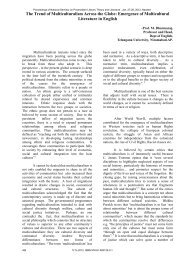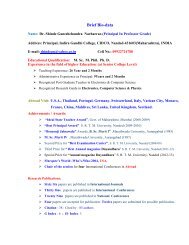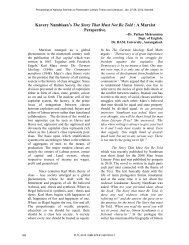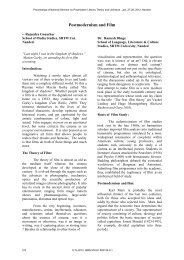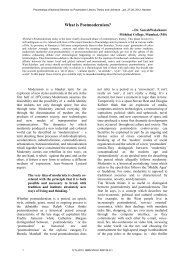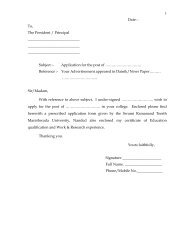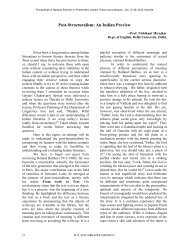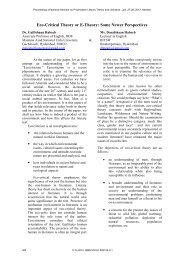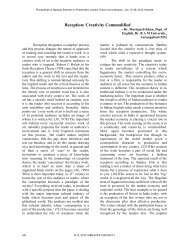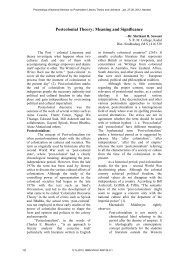Postcolonial Feminist Theory: An Overview - Igcollege.org
Postcolonial Feminist Theory: An Overview - Igcollege.org
Postcolonial Feminist Theory: An Overview - Igcollege.org
Create successful ePaper yourself
Turn your PDF publications into a flip-book with our unique Google optimized e-Paper software.
Proceedings of National Seminar on Postmodern Literary <strong>Theory</strong> and Literature , Jan. 27-28, 2012, NandedAbbess Radegunde is something very close to that ofNietzsche’s Ubermensch. In the first stage of thethree steps of metamorphosis, she is loaded with theChristian values to bear and she bears them withgreat responsibility. In the second stage, she rebelsagainst the values of spiritual purity and physicalchastity when she feels physical, sexual attraction forthe statue of Apollo at Rome. In her final stage, sheovercomes her inner struggles twice, once as shemakes herself return to the stern Christian values ofchastity and again as she understands the meaning oflife through her own experiences and serves forhumanity, which according to her own words is theresult of her own will. Thus, she stands up straight tobe compared to the Nietzschean Ubermensch wholives and leaves her life as an example for others tofollow. Russ is pretty intelligent in her choosing ofthe Ubermensch as a female character who actsagainst the Norsemen in a quite interesting way,tricking them by her powerful speeches and hersuper-womanly supernatural qualities. AbbessRadegunde is thus a strong voice against patriarchyand though set within a twelfth century context,shows very clearly how women should be like notonly in the twenty first century but also in thefuturistic society which is yet to be experienced.IV. THE CONTRAST WITH THE UBERMENSCHAbbess Radegunde’s story and her character,as experienced by a seven years old young boy whoserves as the narrator of “Souls”, leave behind thescope of questioning the true Nietzschean valuesvisible within this character. At one hand, she isabove the level of normal human beings because shehas extra-ordinary skills in learning andremembering things. She knew Latin at a very tenderage of four and could read many languages as well.She showed unique mental faculties which made herAbbess send her to Rome to carry on learning moreaccurately. The way she is gifted with foresight andthe way she fights an intellectual battle against theNorsemen and defeated them successfully, resultingin saving her wards from the fierce Viking men areworth mentioning. On the other hand, she fails torepeat the same life though she understands itsworth. After releasing her wards and after giving anessential insight to Thorvald, the leader of the groupof Norsemen, which will help him save the Abbeyand its inhabitants, Abbess Radegunde leaves theworld with the group of other-worldly extraterrestrialpeople who came to take her back withthem. This shows that though she possesses theinsight to analyse the past, present and future, sheseems to lack the courage to accept the bitterness oflife as she fails to live life all again within its worstconditions. She appears to escape into another world,perhaps a better one, when she finds it difficult tolive on earth. This other world of white-dressedsaints seems to represent the other-worldliness whichCatholicism promises as an after-life. Therefore,Russ’ scientific ending showing Radegunde as analien serves as a trope of attributing to the Christianvalues which Nietzsche tries to run away from.Moreover, Russ moves away from theconventional notion of the Nietzschean Ubermenschbecause her intention is not only to provoke thesuper-natural feeling within her readers, but also toraise a gender awareness which will help her conveyher feminist message. She feels that using a humanbeing for the purpose of her message is not sufficientas a human female lacks the super-natural powersrequired to transgress the worldliness and itsattributes. In her other novels as well, like TheFemale Man and the other stories of Extra(ordinary)People she uses the character of the Superwoman,with unnatural characteristics and prowess whichwill be able to crush man down with one blow.Hence, the use of science fiction is evident in herwritings. Abbess Radegunde is perhaps such ascientific creation which lies above the humanpower, intelligence or understanding. Russ shows heras an alien because she thinks that only an alien canserve her purpose of transgressing the worldliness.Therefore Radegunde cannot be called a properUbermensch in the Nietzschen sense of the term,because though she lives with human beings, she isherself an alien and not a common worldly womanwho overcomes being common.V. THE MALE NARRATORThe figuring of the abbess has anotherperspective. As it is evident from the beginning ofthe novella, her story is narrated by a man who hasexperienced her living period as a boy of seven yearsold. There lies the question. Can the experiences of achild as tender as seven years old be regarded to betrue? They can merely be the hallucinations of ayoung child who might perhaps have f<strong>org</strong>ottenevents. Though he keeps on claiming that heremembers everything by very clearly stating at thebeginning that he is not telling it as it was told to himbut as he saw it, he should not be trusted blindly forhe does not f<strong>org</strong>et to mention that he was a childthen. Throughout the novel, the narrator keepsmentioning how young he was when he used to livein the Abbey as Radegunde’s foster child, how timidand shy he was and how fond he was of his fostermother. At one hand, his tenderness gives the hintthat the whole story about the abbess can be hishallucinations, and at another hand it can also be theimaginations of a seven years old child’s mind.325 PLTL-2012: ISBN 978-81-920120-0-1



